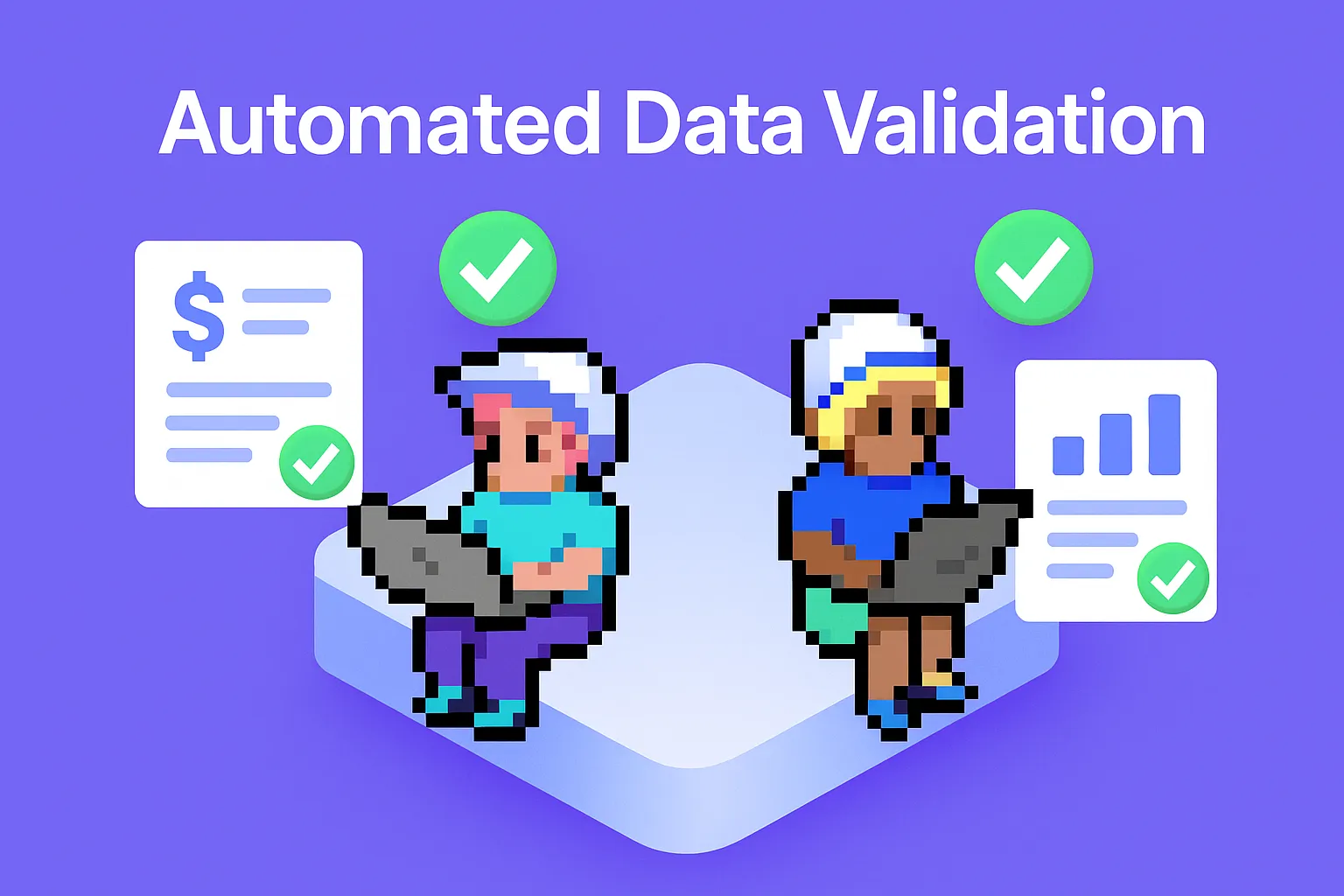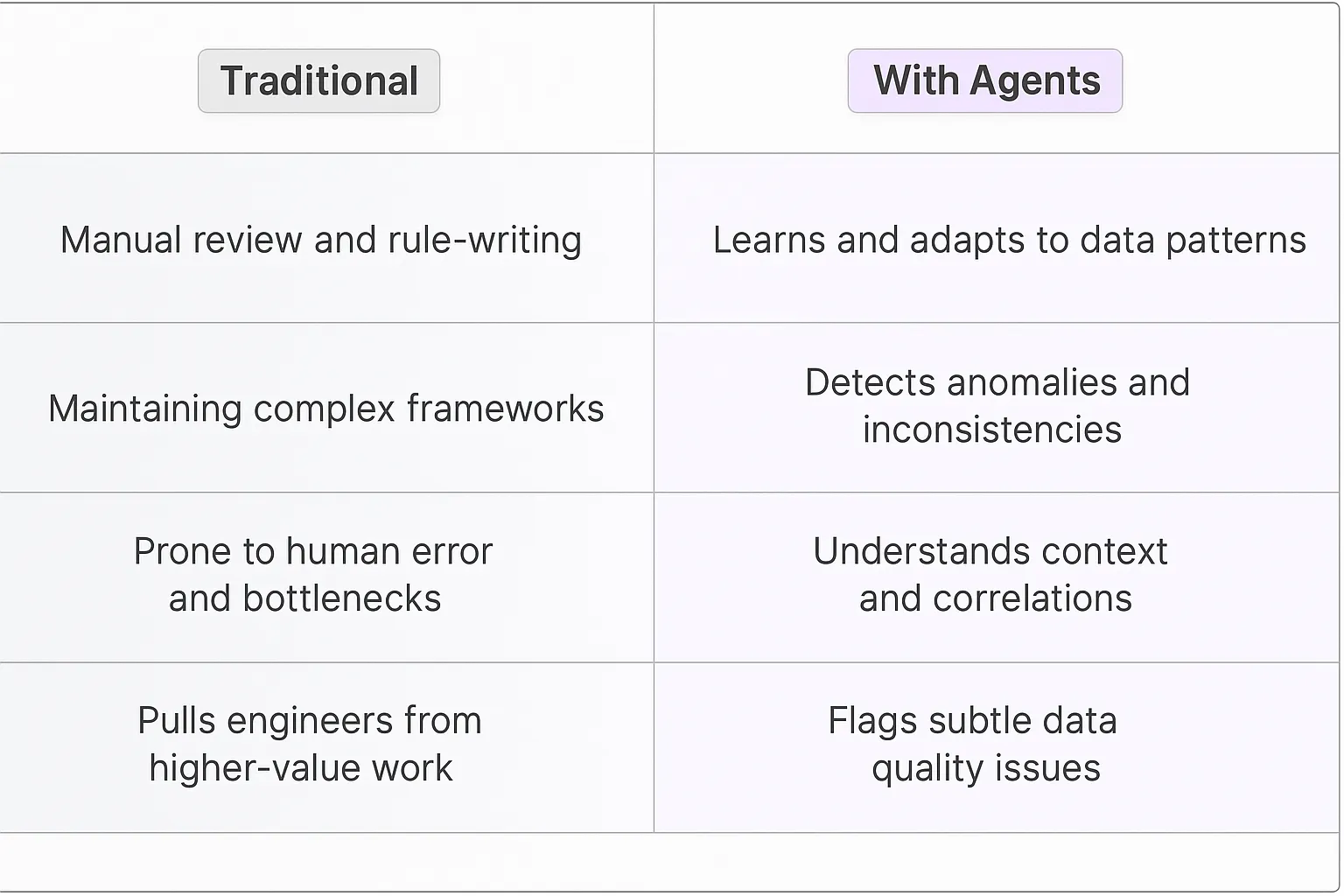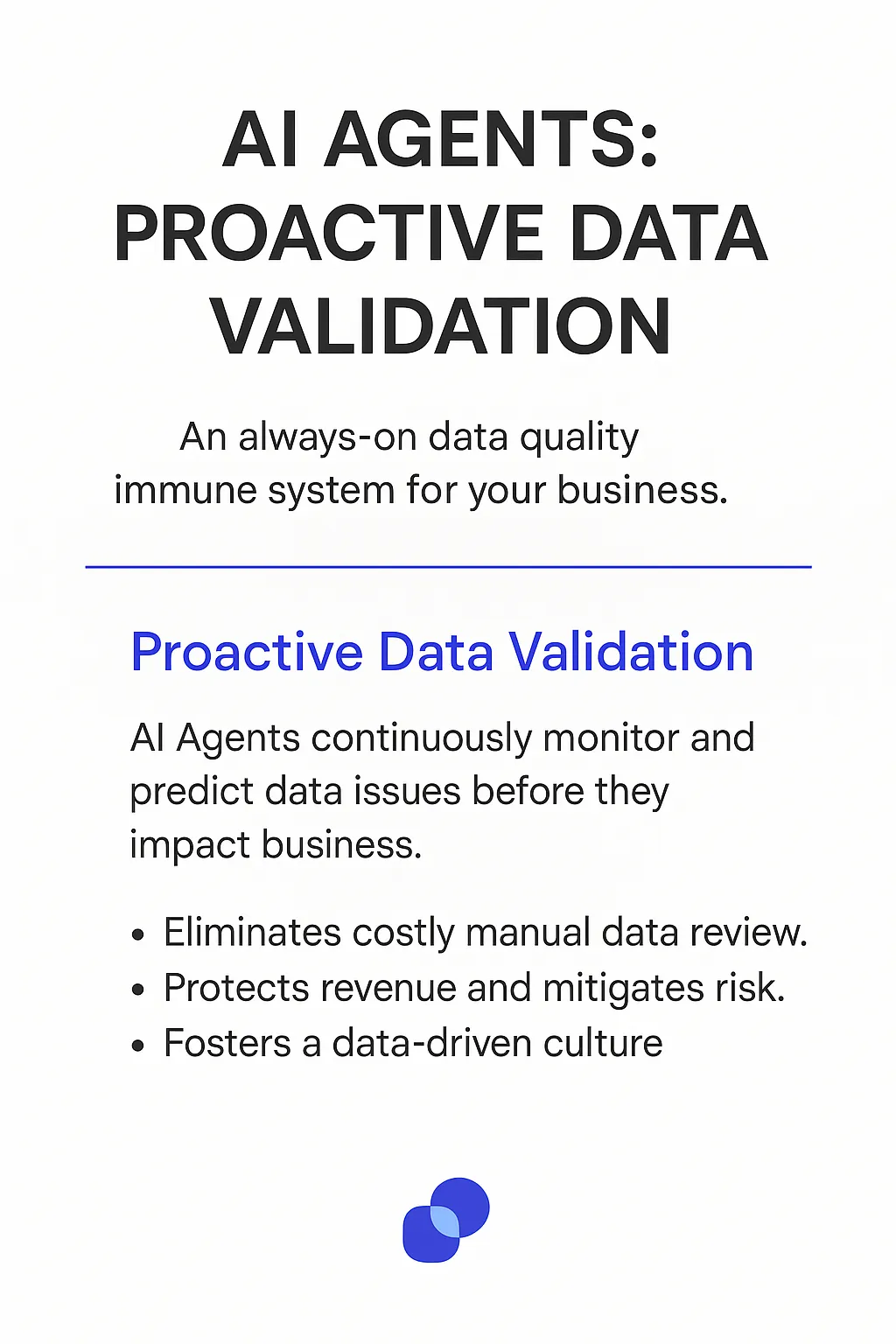Automated Data Validation AI Agents
The Evolution of AI-Powered Data Validation
What is Automated Data Validation?
Automated Data Validation powered by AI Agents represents a fundamental shift in how organizations maintain data quality. Unlike traditional rule-based systems, these digital teammates use advanced machine learning to understand data patterns, detect anomalies, and predict potential issues before they impact business operations. They operate continuously across your data ecosystem, applying learned patterns and validation rules while adapting to new scenarios in real-time.
Key Features of Automated Data Validation
- Adaptive Learning: Systems evolve and improve as they process more data
- Contextual Understanding: Recognition of industry-specific patterns and relationships
- Predictive Capabilities: Identification of potential issues before they become problems
- Scale & Speed: Ability to validate massive datasets in real-time
- Transfer Learning: Leverage knowledge from similar datasets while maintaining privacy

Benefits of AI Agents for Automated Data Validation
What would have been used before AI Agents?
Traditional data validation relied heavily on human data analysts spending countless hours manually reviewing spreadsheets, writing complex validation rules, and maintaining extensive documentation. Teams would build custom scripts and validation frameworks that required constant updates as data schemas evolved. The process was prone to human error, created bottlenecks, and pulled talented engineers away from higher-value work.
What are the benefits of AI Agents?
AI Agents fundamentally transform data validation by introducing adaptive intelligence that learns and evolves with your data patterns. These digital teammates can detect anomalies and inconsistencies that even experienced data analysts might miss.
The real power comes from their ability to understand context. When validating customer transaction data, for example, an AI Agent doesn't just check if values fall within predetermined ranges - it recognizes seasonal patterns, identifies correlations between different data points, and flags subtle inconsistencies that could indicate data quality issues.
From a growth perspective, AI Agents create a powerful network effect. As they process more data, their validation capabilities become increasingly sophisticated. They learn from edge cases, adapt to new data patterns, and build an institutional memory that makes your entire data infrastructure more robust.
The cold start problem that typically plagues new validation systems is effectively solved - AI Agents can leverage transfer learning from similar datasets while maintaining data privacy. This means teams can deploy validation processes in hours instead of weeks.
Most importantly, AI Agents shift the validation paradigm from reactive to proactive. Rather than waiting for issues to surface in production, these systems can predict potential data quality problems before they impact downstream applications. This creates a force multiplier effect, allowing data teams to focus on strategic initiatives while maintaining exceptional data quality standards.

Potential Use Cases of Automated Data Validation AI Agents
Processes
- Cross-referencing customer information across multiple databases to identify discrepancies and maintain data integrity
- Monitoring real-time data streams from IoT devices to flag anomalies and ensure accuracy of sensor readings
- Validating financial transaction data by checking against historical patterns and compliance rules
- Scanning product catalog entries to verify pricing, specifications, and inventory consistency
- Analyzing survey responses to detect invalid or suspicious submission patterns
Tasks
- Automatically checking spreadsheet entries for formatting errors, duplicates, and logical inconsistencies
- Validating email addresses and phone numbers in contact lists against standardized formats
- Reviewing form submissions to ensure required fields contain appropriate data types
- Comparing invoice details against purchase orders and shipping records
- Scanning code repositories for syntax errors and validation issues before deployment
- Verifying data migration accuracy when transferring between systems
The Network Effects of Data Validation AI
Data validation AI agents represent a profound shift in how organizations handle data quality at scale. The most interesting aspect isn't just the automation - it's the compound learning effects that emerge as these systems process more data.
When a data validation AI agent processes millions of records, it develops increasingly sophisticated pattern recognition capabilities. Each validation task makes the system more adept at spotting subtle anomalies that human reviewers might miss. This creates a powerful feedback loop where the AI becomes exponentially more valuable as data volume grows.
The real breakthrough comes from combining validation with prediction. Modern validation agents don't just flag errors - they anticipate where data quality issues are likely to occur based on historical patterns. This shifts the paradigm from reactive cleanup to proactive prevention.
For organizations dealing with massive datasets, these AI agents effectively function as an always-on data quality immune system. The ROI compounds over time as the system prevents costly errors from propagating through business processes.
The next frontier will be validation agents that can automatically implement fixes for common data issues, moving beyond detection into automated remediation. This will create entirely new possibilities for maintaining data integrity at scale.

Industry Use Cases
The real power of AI agents in data validation emerges when we examine their impact across different sectors. I've spent years analyzing how technology transforms business operations, and automated data validation stands out as a critical inflection point. These AI-powered digital teammates operate like specialized data quality experts, bringing intelligence and adaptability to what was previously a manual, error-prone process.
Through my work with startups and enterprise companies, I've observed how data validation AI agents create compounding value - each validated dataset improves the overall data ecosystem while reducing human intervention. The network effects are particularly fascinating: as these agents process more industry-specific data patterns, they become increasingly adept at catching subtle anomalies that even experienced analysts might miss.
What's particularly compelling is how these AI agents have evolved beyond simple rule-based validation into sophisticated pattern recognition systems that understand context and industry nuances. They're not just checking if data fits predetermined formats - they're identifying complex relationships and potential issues that could impact business decisions.
The following industry examples demonstrate how automated data validation AI agents are fundamentally changing how organizations ensure data quality and maintain compliance standards. Each case represents a unique application where AI agents have moved beyond theoretical potential to deliver measurable business impact.
Healthcare Claims Processing: A Data Validation Game-Changer
Medical billing departments face a crushing volume of insurance claims daily - each one a potential minefield of coding errors, missing information, and compliance issues. I've spent time with several healthcare startups, and the manual validation process is arguably their biggest operational bottleneck.
Automated Data Validation AI Agents transform this traditionally painful process by scanning claims in real-time, cross-referencing multiple data points against established medical coding standards, insurance requirements, and patient records. The digital teammate acts as a first line of defense, flagging potential issues before claims ever reach human reviewers.
What's particularly fascinating is how these AI agents learn and adapt to specific provider patterns. For a orthopedic practice I advised, their agent began recognizing subtle correlations between procedure codes, typical treatment durations, and expected medication protocols. When outliers appeared, the agent would flag them for human review while providing context about why the claim looked unusual.
The numbers tell the story: One mid-sized hospital reduced their claims rejection rate from 12% to under 3% within three months of deployment. Their processing team, previously drowning in basic validation tasks, now focuses on complex cases and building better relationships with insurance partners.
But the real magic happens in the feedback loop. Every validated or corrected claim makes the system smarter, building an increasingly sophisticated understanding of what "normal" looks like across different medical specialties, insurance providers, and patient populations. This compounds the value over time - exactly the kind of network effect that makes great software businesses.
Financial Services: Transforming Credit Application Processing
After spending years working with fintech startups, I've noticed a persistent challenge in credit application processing that's ripe for AI-driven transformation. Banks and lenders struggle with the sheer complexity of validating financial documentation, employment records, and credit histories - often leading to costly delays and frustrated applicants.
Data Validation AI Agents are rewriting this story in fascinating ways. A digital teammate can process hundreds of applications simultaneously, cross-referencing data points across tax returns, bank statements, pay stubs, and credit reports. What's particularly interesting is how these agents detect subtle inconsistencies that even experienced underwriters might miss.
One mid-market lender I advised implemented this technology with remarkable results. Their AI agent learned to identify patterns in self-employed income documentation, a traditionally thorny area for validation. The system developed an understanding of seasonal business fluctuations and industry-specific revenue patterns, flagging applications that deviated from expected norms.
The impact on their operations was profound: validation time dropped from 48 hours to 15 minutes per application. But the really compelling metric wasn't speed - it was accuracy. Their loan default rate decreased by 23% in the first year, suggesting the AI was catching risk factors that humans had been missing.
The network effects here are particularly fascinating. Each validated application enriches the system's understanding of different business types, income patterns, and risk indicators. One lending officer told me, "It's like having a veteran underwriter who's seen every possible scenario, working 24/7 across our entire portfolio." That's the kind of scalable expertise that creates lasting competitive advantages in financial services.
Considerations & Challenges
Technical Challenges
Building effective data validation AI agents requires navigating several complex technical hurdles. The first major challenge lies in handling diverse data formats and structures. Your digital teammate needs robust parsing capabilities to process everything from CSVs to JSON to unstructured text. We've seen teams struggle when their validation agents can't adapt to slight variations in input formats.
Edge cases present another significant technical obstacle. Real-world data is messy - it contains nulls, special characters, and inconsistent formatting. Your validation agent must gracefully handle these scenarios without breaking or providing false positives. From my experience working with startups, about 30% of initial validation rules need refinement after encountering edge cases in production.
Operational Challenges
The human side of implementing data validation agents is equally nuanced. Teams often underestimate the time needed to properly train their digital teammates on business rules and validation logic. You'll need subject matter experts to codify validation rules, test edge cases, and continuously refine the agent's understanding.
Change management also proves challenging. Existing teams may have developed their own validation workflows and shortcuts. Transitioning them to work alongside an AI agent requires careful planning and clear communication about roles and responsibilities. I've observed that successful implementations typically involve a phased rollout where the agent first runs in parallel with manual processes.
Scale & Performance
As data volumes grow, validation agents face increasing pressure to maintain speed and accuracy. The computational resources required can escalate quickly, especially when dealing with real-time validation needs. Smart caching strategies and efficient rule processing become critical. One fintech startup I advised saw their validation costs triple in three months due to unexpected data growth.
False positives and negatives also become more impactful at scale. A 1% error rate might seem acceptable during testing, but that translates to thousands of incorrect validations when processing millions of records. Teams need robust monitoring and feedback loops to continuously improve accuracy while maintaining performance.
The Future of Intelligent Data Validation
The emergence of AI-powered data validation marks a critical inflection point in how organizations handle data quality. These digital teammates aren't just automating existing processes - they're creating entirely new possibilities for maintaining data integrity at scale. The compound learning effects and network benefits make this technology particularly powerful, as each validated dataset improves the system's overall capabilities.
Looking ahead, we'll see these systems move beyond detection into automated remediation, creating self-healing data ecosystems. Organizations that embrace this technology now will build significant competitive advantages through superior data quality and reduced operational overhead. The future of data validation isn't just automated - it's intelligent, adaptive, and continuously improving.













